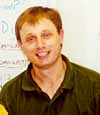Birth defects research project nets $5.9 million grant
by Dick PetersonPublic Relations
An MUSC study of how the human heart develops and how it may go wrong in babies with congenital malformation and birth defects just got a major $5.9 million boost from the National Institute of Child Health and Development.
The five-year, NIH/NICHD grant awarded to MUSC and led by principal investigator Rob Gourdie, Ph.D., of the Department of Cell Biology and Anatomy, continues a long-term probe into factors that lead to congenital heart defects in children.
 Dr.
Rob Gourdie
Dr.
Rob Gourdie
Gourdie’s team includes investigators at the University of Pennsylvania, the Institute for Cancer Research, Fox Chase Cancer Center in Philadelphia and Duke University.
The study explores the properties of different “invasive” cell populations
normally present in the embryo, each of which appear to have important
roles in shaping the structure and electrical conductivity of the early
heart muscle through embryonic development to the more complex heart of
a newborn.
“Understanding the factors involved in piecing together the embryonic
heart bit-by-bit is a step toward one day preventing the occurrence of
congenital defects,” Gourdie said.
The clinical project of the program studying the human genetics of electrical conductivity problems is being undertaken jointly by Terry O’Brien, M.D., and Gourdie at MUSC, and by former MUSC faculty member Woody Benson, M.D., Ph.D., at Children’s Hospital, Cincinnati.
Two basic science projects under way at MUSC include studies of the developmental biology of the cardiac pacemaking and conduction system, and research led by MUSC’s Ed Krug, Ph.D., and Roger Markwald, Ph.D., examining the role of invading cell populations in embryonic and fetal development. They examine this role particularly as it relates to the invasive cells that will eventually lay down the heart’s coronary arterial plumbing.
“These inwardly migrating or invading cell populations seem to have decisive roles in molding the embryonic heart. Changing it from a primitive tube-like structure to the mature and complicated heart pump that we see in the adult,” he said. “In a sense, the plumbing and wiring of the heart seem to be linked.”
A third basic science probe is led by Cecilia Lo, Ph.D., of the University of Pennsylvania and Peggy Kirby, Ph.D., of the Duke University Medical Center and examines factors that control the migration of the invading cell populations as they influence the transformation of the heart into a multi-chambered pump.
Leaders of science cores supporting the program project at MUSC include Andy Wessels, Ph.D., Steven Kubalak, Ph.D., and Bobby Thompson, Ph.D. John Burch, Ph.D., at the Fox Chase Cancer Center will provide key input to transgenic mouse production and gene chip array analyses carried out in the science cores. Evelyn Fabunan of MUSC has a busy and important role as program administrator of this multi-center study.
Gourdie said that the study, based at MUSC, is really the formalization of a group collaboration between basic and clinical investigators who have worked closely together for much of the past five years.
“I anticipate that in the next five years this group will continue to make significant contributions to our understanding in this area, providing still more insight into how heart development is regulated,” said Gourdie.
“We are particularly excited about the award especially in the context
of MUSC’s future commitment to research into diseases of children as evidenced
by the current building of our new MUSC Children’s Research Institute,”
Gourdie said. “We hope that our work will lead to a better understanding
of the origin of birth defects in babies and children, perhaps one day
leading to treatment and repair of hearts damaged by congenital disease.”